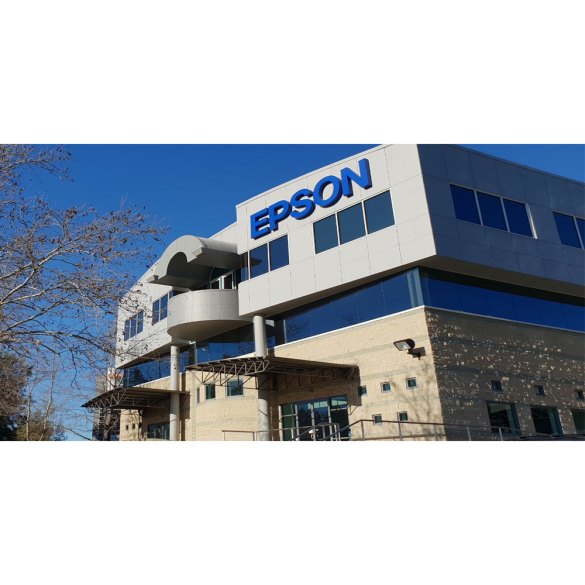
Above: Epson Australia HQ in Macquarie Park, NSW
Epson has announced that, as of December 2023, all electricity used at Epson Group sites around the globe1 is from renewable sources.
This makes Epson the first2 in the domestic manufacturing industry to complete the transition to renewable electricity at all its sites worldwide.
The Epson Group consumes approximately 876 GWh3 of electricity per year. By sourcing renewables to cover this demand, Epson expects to reduce its annual carbon dioxide emissions by approximately 400,000 tonnes.
Epson publicly committed to becoming carbon negative and underground resource4 free in its Environmental Vision 2050. The use of renewable electricity is a key means by which Epson seeks to reach its goal of achieving decarbonisation.
In line with this, Epson declared, in March 2021, that it would switch to 100% renewable electricity to meet the electricity needs at all Epson Group sites1 around the world by 2023.
In November 2021, the switch was completed in Japan. The global switch to renewable electricity was completed on schedule in December 2023.
In addition to sourcing renewable electricity, Epson will promote the broader adoption of renewable energy, including by generating more of its own power and by supporting the development of new power sources through co-creation5.
Epson will reduce the amount of energy associated with production and products and will pursue further advances in resource circulation to attain the goal of becoming carbon negative.
Craig Heckenberg, managing director, Epson Australia, said, renewable electricity is a top priority in the company’s decarbonisation strategy.
“In our renewed Environmental Vision established in 2021, Epson made a firm commitment to achieve carbon negative and be underground resource free by 2050. We have set targets to reduce greenhouse gas emissions in our operations and value chain, aligning with the 1.5°C scenario of the Paris Agreement and the criteria of the Science Based Targets initiative (SBTi).
“By 2025, our aim is to reduce scope 1 and 2 greenhouse gas emissions by 34% compared to FY2017 levels. To achieve this, renewable electricity is a top priority in our decarbonisation strategy.”
Global President Yasunori Ogawa said Epson has aways demonstrated a proactive approach to environmental action.
“We have maintained the founder’s commitment to preserving the cleanliness of nearby Lake Suwa and became the world’s first company to eliminate CFCs from our manufacturing processes. Now we have successfully completed the switch to 100% renewable electricity at all Epson Group sites in just two years and ten months since declaring our commitment to doing so in 2021.
“This will not only help us to achieve our own goals but will also help to facilitate a broader adoption of renewable electricity within society by spreading awareness. Our goal of realising social sustainability is a bigger issue, one fraught with difficulty, but we will act with determination to address the issues with a spirit of creativity and challenge.”
1 Excludes some sales sites and leased properties where the amount of electricity consumed cannot be determined
2 Among Japanese companies that have joined the RE100. Current as of January 9, 2024, per Epson research.
3 Results for the 2022 fiscal year ended March 2023. Includes co-generation system (CGS) electricity and privately generated electricity.
4 Free of non-renewable resources such as oil and metals
5 A project to expand the sourcing of renewable electricity in Nagano Prefecture
Comment below to have your say on this story.
If you have a news story or tip-off, get in touch at editorial@sprinter.com.au.
Sign up to the Sprinter newsletter
